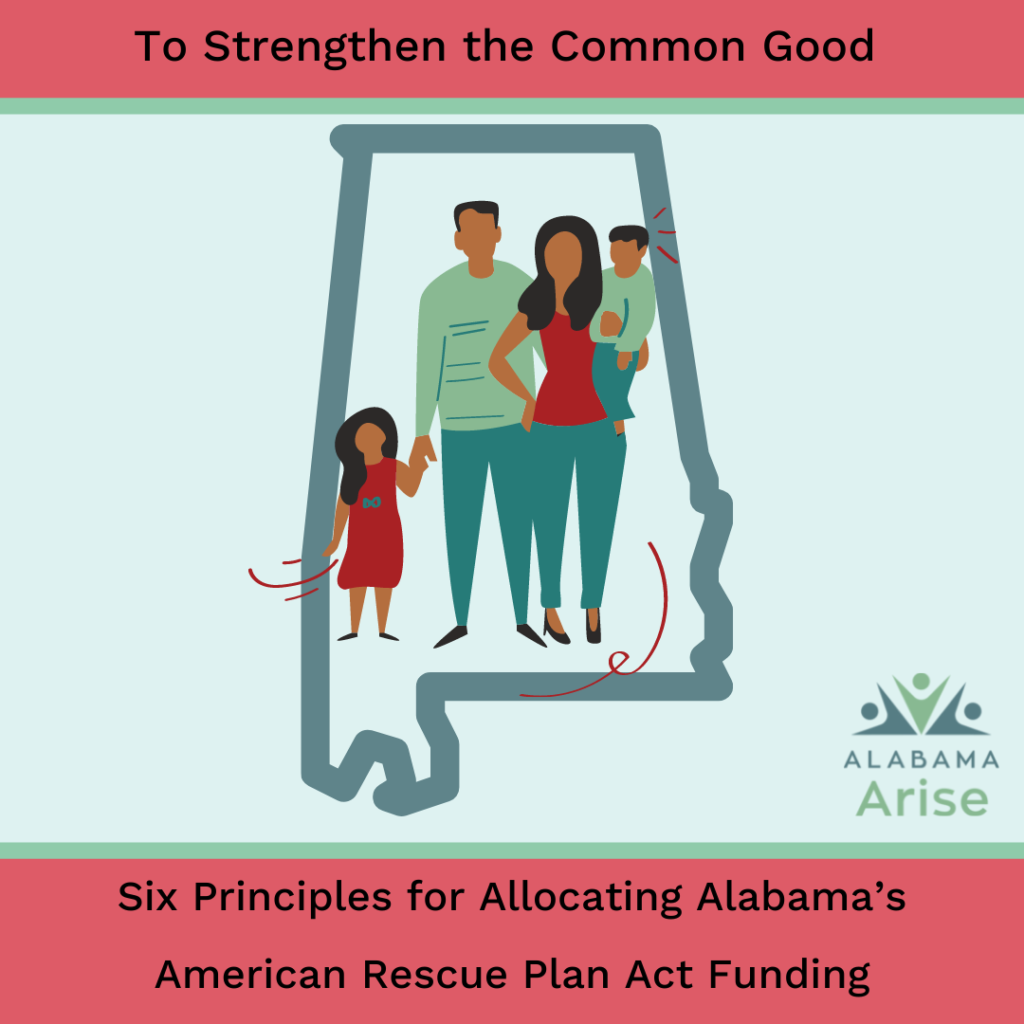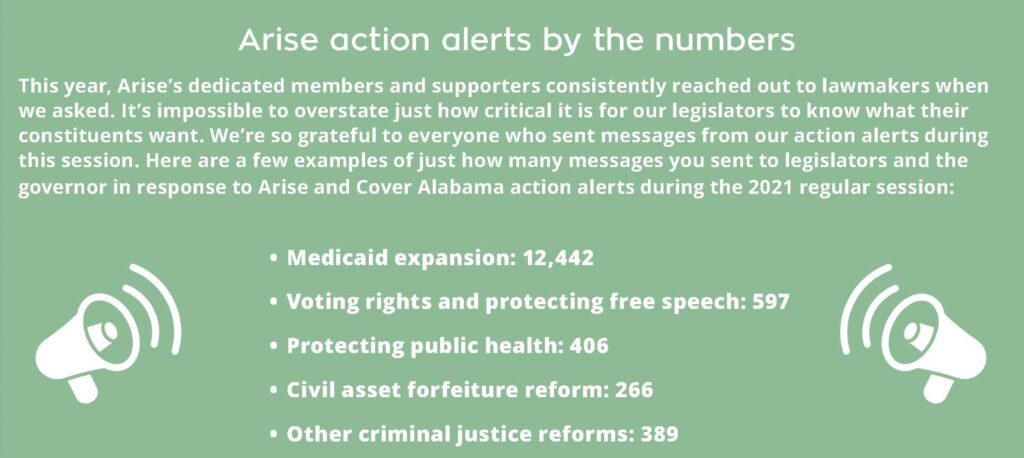
Introduction
Dear Governor Ivey,
One of the darkest years in recent memory has put Alabama’s families, communities, health system, businesses – and our leaders at all levels – to the test. Thank you for all your efforts to keep Alabamians safe and secure during this unprecedented emergency. Now that a post-COVID world is dawning, the leadership test doesn’t end. Rather, it enters a critical new phase: Your vision and your actions will help determine what a post-COVID Alabama looks like, and history will record the results. Will the comfort of the familiar pull us back into “the way we’ve always done things”? Or will we count this ordeal as an awakening to bold new possibilities for our state?
For the organizations listed below, all signs point to the second option: The opportunity to address chronic problems that the pandemic has only worsened; a chance to inspire Alabamians with a recovery plan that lifts all communities toward a healthier, more prosperous future; and – most pragmatically – the power of $4 billion in new federal funding to turn vision into reality. We enclose for your consideration six principles that we believe can guide state and local leaders in the most productive, equitable and lasting use of these tax dollars.
The signers of this letter are advocates who work closely with the communities hit hardest by the COVID-19 health and economic crises. For these Alabamians, recovery from the pandemic must mean more than restoring the pre-COVID status quo. With courageous and creative leadership, community engagement across the state, and wise use of historic levels of funding, we have what we need to move Alabama forward and strengthen the common good.
We stand ready to answer any questions you may have about our recommendations.
Respectfully submitted,
The Undersigned Alabama Organizations
Signatories
The following organizations support a principled approach to American Rescue Plan Act funding that will strengthen Alabama’s common good:
ADAP
AIDS Alabama
Alabama Appleseed Center for Law and Justice
Alabama Arise
Alabama Coalition for Immigrant Justice
Alabama CURE
Alabama Possible
Alabama Solutions
Alabama State Conference of the NAACP
Bay Area Women Coalition, Inc.
Birmingham Society of Friends
BirthWell Partners Community Doula Project, Birmingham
Church & Society, Anniston First United Methodist Church
Community Enabler Developer, Inc.
Disabilities Leadership Coalition of Alabama
Disability Rights & Resources
The E.WE Foundation
Faith and Works Statewide Civic Engagement Collective
Grace Presbyterian Church (PCUSA), Tuscaloosa
Greater Birmingham Ministries
Hispanic Interest Coalition of Alabama
Hometown Action
Immanuel Presbyterian Church (PCUSA), Montgomery
Jobs to Move America
League of Women Voters of Alabama
Medical Advocacy & Outreach
The Nightingale Clinic, Birmingham
Nurse Practitioner Alliance of Alabama
Open Table United Church of Christ, Mobile
People First of Alabama
Project Hope to Abolish the Death Penalty
Restorative Strategies, LLC, Birmingham
Sisters of Mercy
Sisters of St. Joseph
The Sisters, Tuscaloosa
St. Luke’s Episcopal Church, Jacksonville
Unitarian Universalist Fellowship of Mobile
University of Montevallo Social Work Program
Volunteers of America Southeast
West Alabama Women’s Center
YMCA of Birmingham
YWCA of Central Alabama
Letter text
To Strengthen the Common Good: Six Principles for Allocating Alabama’s American Rescue Plan Act Funding
The COVID-19 crisis has created enormous new challenges for Alabama, while shining a harsh light on long-neglected ones. To strengthen and expedite recovery, the American Rescue Plan Act (ARPA), passed by Congress in March 2021, is pumping $4 billion into Alabama’s economy over the next three years. New funding at this scale can be transformative for our state, but only if we take a transformative approach to how we spend it.
The starting point is recognizing and breaking our old mindset of scarce resources, limited possibilities and patchwork policy solutions. For too long, Alabama’s leaders – and the voters who empower them – have settled for poor outcomes in health, education, community development and other measures of shared prosperity, because they thought we couldn’t tackle such deep problems. The pandemic is challenging us to reclaim – and redefine – the common good. ARPA funding gives us a rare opportunity to meet the challenge, if we’re willing. The undersigned organizations offer the following six principles as a framework for seizing this unprecedented opportunity to build a better Alabama for all.
-
Engage local communities at every step.
The COVID pandemic has hit people where they live, work, learn and play. The best use of ARPA funds will reflect the needs and goals identified by ordinary Alabamians through a process that solicits, accommodates and heeds public input.
Crucial question
How are local leaders, advocates and community members involved in identifying and prioritizing both needs and solutions?
Recommendations
- Identify or create effective, inclusive, results-oriented, nonpartisan, community-based councils in each county or region to develop recommendations for local ARPA funding priorities. Potential lead organizations may include United Way, community foundation or Community Action Agency advisory bodies; children’s policy councils; university extension services; or community round tables convened by local governments. Make it a priority to engage segments of the community underserved by the status quo, such as Alabamians of color, people who work for low wages or have lost jobs, and those who lack adequate basic services.
- Provide opportunities for broad public participation in developing and finalizing local, regional and state ARPA spending plans. State leaders should agree not to appropriate ARPA funds until the public engagement process is completed.
- Review existing community and state needs assessments to identify common local concerns, as well as gaps in information and perspective.
- Facilitate information-sharing and coordination among local, regional and state efforts to enhance efficiency, leverage capacity and avoid duplication.
- Designate a statewide source of technical assistance, best practices and other aids to local and regional decision-making.
-
Aim for equity in outcomes.
Some regions, counties, municipalities and populations have suffered deeper blows than others from the pandemic because of chronic gaps in resources, infrastructure, services and opportunities. Rural Alabamians, people of color, people with disabilities, and women have faced disproportionate impacts from both the health and economic crises. Simply restoring the prior status quo is not transformation. ARPA funding decisions should take into account the un-level playing field of COVID recovery, targeting investment toward improving the basic standards of living for areas and people long left behind. Assistance to those most deeply impacted by COVID-19 should come with as little “red tape” and administrative delay as possible. Direct cash assistance to people with low incomes should be a priority.
Crucial question
How do proposed funding allocations contribute to the removal of historic barriers to individual, family and community well-being?
Recommendations
- Within each jurisdiction (state, region, county, city), use socioeconomic indicators such as poverty, unemployment and workforce participation rates, and racial/ethnic health disparities to target strategic, expedited community investments.
- Provide grants to minority- or women-owned small businesses, especially those that did not receive earlier federal business loan assistance.
- Provide up to $13 per hour in bonus or “premium” pay – on top of their regular pay – to essential public and private workers, up to $25,000 per worker per year, as allowed under the Rescue Plan, for work performed during the public health emergency, awarding the largest bonuses to the lowest-paid workers.
- Provide cash assistance to SNAP food assistance recipients with incomes below 50% of the Federal Poverty Level.
- Provide a grocery tax rebate to households earning less than 200% of the federal poverty level.
- Fund and train organizations that already help people access SNAP, Medicaid, tax credits and other supports as navigators for the full range of ARPA assistance, including the expanded federal Child Tax Credit.
-
Maximize well-being by addressing health in all policies.
What began as the COVID-19 health emergency quickly became an economic and social crisis. In turn, the toll the virus has taken on communities of color, people with disabilities and the uninsured revealed how deeply socioeconomic conditions are connected to health risks and outcomes. Nutrition, housing, transportation, education and other factors are widely recognized as social determinants of health, but Alabama has been slow to broaden our approach to health policy and funding. ARPA offers us the chance to apply the lessons of COVID-19 and design a recovery plan that puts eliminating health disparities and improving health at the center of investments in every sector.
Crucial question
How does this funding proposal advance the goal of a healthier Alabama?
Recommendations
- Name it and claim it: There’s enough ARPA funding to achieve significant health improvement in Alabama if leaders set clear, ambitious goals and plan accordingly.
- Engage public health experts to incorporate health goals and strategies across the full span of ARPA allocation planning.
- Increase professional staffing at county health departments.
- Strengthen our workforce, families and communities by using the generous ARPA incentives (an estimated $720 million) to expand Medicaid and close the coverage gap for 340,000 Alabamians with low incomes.
- Invest in mobile mental health crisis services and expand mental health crisis centers.
- Expand school nurse programs and school-based mental health services.
- Fund Healthy Food Financing grants for fresh food markets, including mobile markets, as well as local worker-owned food cooperatives to boost local economies, provide jobs and expand availability of fresh foods in food apartheid areas (where healthy food access is hindered by racially discriminatory economic or political factors) and food swamp neighborhoods (where food and beverage sources like fast food outlets, convenience stores and liquor stores crowd out healthier food options).
-
Invest in existing assets and capacities to help funds work faster, go farther and avoid duplication.
Over recent decades, budget cuts to education, public health and other essential services – and our failure to expand Medicaid – have left Alabama unprepared for a prolonged emergency like COVID-19. Similarly, charitable nonprofit organizations across the state have faced unprecedented demand for their services during the pandemic and risen to the challenge. By directing ARPA funds to restoring critical services and supporting experienced, trusted charitable nonprofits, state and local governments can strengthen community resources, meet needs efficiently, avoid reinventing the wheel, and multiply the economic benefit.
Crucial question
What programs and organizations are already working to meet the goals of this ARPA funding proposal, and how can a partnership approach improve outcomes?
Recommendations
- Fund organizations that are well-positioned to reach people with significant barriers to accessing support, such as immigrants, people with disabilities and people of color with low incomes.
- Expand community schools in neighborhoods where the pandemic has taken a particularly heavy toll.
- Provide additional funding for existing in-home early childhood education services like HIPPY, Parents as Teachers and Nurse-Family Partnership programs.
- Increase support for school-based social and health services, particularly in high-poverty neighborhoods and districts.
- Help children catch up on unfinished learning by expanding the teacher workforce through pay increases and other supports for early childhood teachers, child care workers and special education teachers who work in at-risk communities and schools.
- Expand existing in-home and community-based services for the elderly and people with disabilities.
- Expand or develop local alternatives to incarceration such as specialized courts, community correction programs, re-entry programs and services for people at risk of offending.
- Invest in workforce development by creating subsidized apprenticeships, two-year scholarship programs, and subsidized certificate programs for low-income workers.
-
Think big and create a 21st-century infrastructure for the common good.
Alabamians have long recognized the human cost of inferior and outdated public works and services like sanitation, health care, transportation and information technology systems. But the monetary cost has kept our leaders from modernizing them. COVID has revealed the deadly consequences of that neglect, and ARPA includes massive funding aimed at moving states forward on all of these fronts, including a large share for education (not addressed in these recommendations because of specific earmarking). The opportunity calls for bold leadership and vision. Our spending plan must seek to coordinate local, regional and statewide investments for fundamental and long-lasting impact.
Crucial question
How will today’s investments benefit future generations of Alabamians?
Recommendations
- Modernize and align state agency computer systems to create a “no wrong door” approach to streamlined eligibility and enrollment across benefit programs.
- Modernize and improve state unemployment insurance (UI) technological infrastructure, application and payment systems.
- Upgrade water and sanitation systems, prioritizing communities with a history of unsafe water quality and waste-water disposal.
- Provide critical infrastructure and equipment (such as trucks, refrigeration, trainers, lift gates, etc.,) to local food banks and food pantries to expand emergency food distribution.
- Expand Alabama’s affordable housing capacity, stabilize families and communities and reduce homelessness by seeding the Affordable Housing Trust Fund with $25 million and providing grants for eligible new construction, renovation and maintenance.
- Recognizing that lack of reliable transportation is a major hindrance to health care, economic activity and workforce development in many areas of the state, seed the Public Transportation Trust Fund with $20 million and provide state match for increased federal public transportation funding.
- Promote equity in high-speed internet access by targeting earmarked broadband funding to help local service providers expand into underserved areas and by ensuring community oversight of access and quality standards.
- Provide state technical assistance to localities in consolidating, evaluating and negotiating broadband contracts to minimize the danger of approving projects with little public benefit.
-
Build public trust and engagement by following the highest standards of documentation, transparency and accessibility of information about funding awards and expenditures.
Spending taxpayer dollars is always a tremendous responsibility. When it comes to spending billions in a short time, the potential for slow uptake, poor decisions and misuse only increases. Alabama can ensure that the generous ARPA funds do their appointed job by establishing clear guidelines and full disclosure for the entire funding process, from eligibility of applicants to allocation decisions to project expenditures and results.
Crucial question
How will Alabamians be able to track the allocation, use and impact of their federal ARPA tax dollars in the state?
Recommendations
- Create and maintain a public database of state and local ARPA funding allocations and expenditures, easily searchable and sortable by project or partner name, policy topic, service area, grant amount, award date, expenditure date and other key factors.
- Adopt simple, accessible application and reporting requirements that allow grantees and recipients to establish their credibility and tell their story without jumping unnecessary bureaucratic hurdles.
- Use local ARPA planning groups as conduits for ongoing reporting and feedback about plan implementation, obstacles, impact and sustainability. Build a robust outreach operation to help people access available federal, state and local aid.





 A big change on the health care front this year is the prominent role of Medicaid expansion in legislative discussions, both on and off the chamber floors. Gov. Kay Ivey can propose expansion through administrative steps, but lawmakers still control the purse strings. So legislative advocacy is essential!
A big change on the health care front this year is the prominent role of Medicaid expansion in legislative discussions, both on and off the chamber floors. Gov. Kay Ivey can propose expansion through administrative steps, but lawmakers still control the purse strings. So legislative advocacy is essential! Several criminal justice improvements have moved forward this year. These include partial reform of sentencing under the Habitual Felony Offender Act (HFOA) and expanded alternatives to imprisonment. Bigger reforms like HFOA repeal and abolition of driver’s license suspension have been slowed due to opposition, though. That inaction has persisted even in the face of a U.S. Department of Justice lawsuit over unconstitutional prison conditions.
Several criminal justice improvements have moved forward this year. These include partial reform of sentencing under the Habitual Felony Offender Act (HFOA) and expanded alternatives to imprisonment. Bigger reforms like HFOA repeal and abolition of driver’s license suspension have been slowed due to opposition, though. That inaction has persisted even in the face of a U.S. Department of Justice lawsuit over unconstitutional prison conditions. Efforts to protect and expand voting rights continue to face an uphill battle. Bills prohibiting curbside voting have advanced, despite the practice’s success in Mississippi and other states. Meanwhile, a bill allowing no-cause absentee voting stalled, as did measures on early voting and same-day voter registration. Legislation improving voting rights restoration did advance, but only after removal of a provision that would have ended a de facto poll tax: the requirement for people with convictions to pay all fines and fees before regaining voting rights.
Efforts to protect and expand voting rights continue to face an uphill battle. Bills prohibiting curbside voting have advanced, despite the practice’s success in Mississippi and other states. Meanwhile, a bill allowing no-cause absentee voting stalled, as did measures on early voting and same-day voter registration. Legislation improving voting rights restoration did advance, but only after removal of a provision that would have ended a de facto poll tax: the requirement for people with convictions to pay all fines and fees before regaining voting rights.